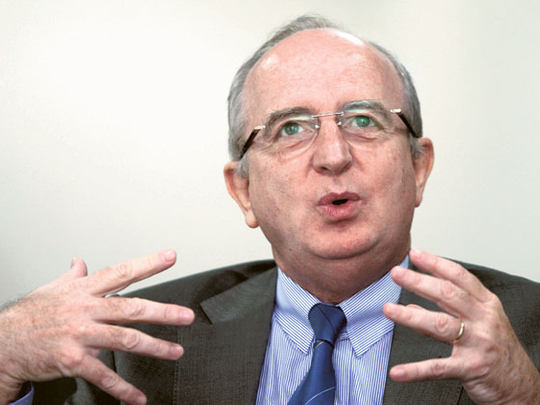
Dubai: In its 2020 Vision statement, the United Nations World Tourism Organisation said global tourism-related revenues will hit $2 trillion (Dh7.34 trillion) by 2020.
Looking at it from another perspective, global tourism will grow from 1.006 billion travellers in 2010 to 1.561 billion in 2020. It is a share of this pie that Emirates Holidays, the tour operating arm of Emirates airline, is aggressively trying to grab.
Frédéric M. Bardin, who recently took charge of Emirates Holidays as senior vice-president, talks to Gulf News ahead of the end-April launch of the latest "Emirates Holidays A World Of Choice" brochure. Among the other strategies he has lined up for the company, Bardin discusses plans for higher contribution from markets outside the GCC.
Gulf News: What is the growth strategy for Emirates Holidays for 2011-12?
Frédéric M. Bardin: We have seen the beginning of the rebound from the economic crisis. We were affected to a point.
It's not like our business dropped 50 per cent, but there was a drop in business in 2009 and 2010 was more about stabilisation. Now, 2011 is definitely picking up.
What is your revenue split between the GCC and the rest of the world markets? How do you expect that to change?
The GCC accounts probably for about 70 per cent of our business at present while the remaining comes from anywhere in and around the Mediterranean. You can buy Emirates Holidays packages out of Singapore, Hong Kong or Beijing, but each of these other markets contribute fairly small figures — about 30 per cent.
However, South Africa and Turkey are standing out there.
I would want to change this ratio in the next few years. Having said that, the UAE will always remain our biggest market as it is the home base of Emirates airline. (Emirates Holidays are all based on Emirates flights.) But I would hope within the next five-odd years, we would end up with the UAE representing only about 40 per cent of our total business, the rest being spread over the bigger portion of the network.
Budget travel has been on the increase in the last two years owing to the downturn while Emirates Holidays is positioned in the upper segment of the market. Did you lose business to the budget segment?
The budget segment is not the main consideration for us. Well, it can be the main consideration for some, but not for all.
Despite the financial dire straits, people still fly business or first class or buy a Rolls-Royce. It is like the budget carriers that you have got more than ever now in the region.
But at the same time, Emirates is getting bigger and bigger and making more money every year as the load factor continues to increase.
So, we are not losing customers to the budget segment. We have always been rather on the upper-end of the market.
With airlines such as Air Arabia and Etihad Airways having their own holiday divisions, what kind of competition are you facing in the region?
At Emirates Holidays, we have a level of expertise that a lot of people are ready to pay for. The budget airlines would probably not have the range or tours or the hotels that we have.
We are only aiming at four- and five-star hotels placed highest in their leagues. It is what distinguishes us from all others. Beyond that, of course, there is a lot of competition. There is Etihad Holidays, for instance, which has a glossy brochure. Then, Gulf Air Holidays does a little bit, but not so much.
And then, there is Dnata which actually has on offer more choices than we do.
Having said that, going through tour operators is not necessarily a more expensive way of planning a holiday [as against planning it on your own]. It is one of the major misconceptions that most travellers have.
Do you see the recent currency fluctuations with the euro or dollar influencing people's travel plans this year?
It may to an extent. The euro-dollar gap is getting huge now compared to what it was last year.
Obviously, it is going to make travel to Europe, for instance, more expensive. But don't forget that Emirates Holidays sells out of 30 different markets and not only out of the UAE.
So we get a much mixed bag of things and thus all in all it doesn't really impact us. What is bad for a buyer here is good for the buyer on the other side.
Which are your strongest growth markets at present and how do you see that changing over the next couple of years?
It still remains the GCC within which the UAE occupies the top slot, followed by Saudi Arabia and Kuwait. We have been selling in the whole Middle East for some time now, so these are our established markets.
Of course, our business has dried up pretty much out of Egypt, Libya and Tunisia in the last few weeks, but these are not huge markets. Bahrain, Qatar and Oman are more important markets for us.
As for 2011 and 2012, we are also starting to make quite a bit of progress in other areas. For instance, we have a big push out of Turkey as well as South Africa this year. These will be out future growth markets. And with regards to the new routes in the pipeline, we follow all the Emirates route launches.
20% Revenue rise likely
Emirates Holidays expects its revenue as well as volumes to exceed 20 per cent in the current financial year from April 2011 to March 2012, according toFrédéric M. Bardin, newly appointed Emirates Holidays' senior vice-president.
"The yields, however, will remain about the same," Bardin said. On the company's performance for the financial year ended on March 31, Bardin did not divulge specific numbers but said it was not one of the company's "bumper years".
"Business was picking up but it wasn't one of our bumper years. I think in FY2011-12 we are going to be back to 2008-09 levels or close."












